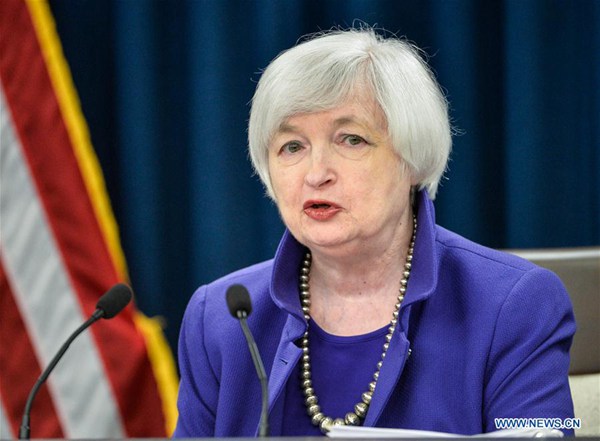

 |
| U.S. Federal Reserve chairwoman Janet Yellen speaks at a press conference in Washington D.C., the United States, Dec. 16, 2015. (Xinhua/Bao Dandan) |
The U.S. Federal Reserve decided on Wednesday to raise the benchmark interest rate by 0.25 percentage points, the first interest rate increase since 2006.
Over the past three decades, the Fed has had five definite interest rate hikes. It is generally agreed that a raise of 0.25 percentage points does not usually have a large impact on the economy. But because this is the first interest rate hike in nearly ten years, it indicates a recent strengthening of the U.S. economy.
Zeng Gang, the head of the Institute of Finance & Banking at the Chinese Academy of Social Sciences (CASS), said that the Fed's rate hike would impose short-term pressure on the devaluation of the renminbi. In the medium and long term, China's yuan will continue to appreciate. Therefore, the Fed rate hike will have a neutral impact on the renminbi. In fact, the devaluation of the yuan is positive for China's export-oriented enterprises.
Ding Shuang, chief economist for the Standard Chartered Bank of Greater China, told People's Daily Online that U.S. dollars are becoming a strong currency; thus, in addition to China's yuan, currencies all over the world will face devaluation in the short term. Compared with other currencies, the depreciation of China's yuan against the U.S. dollar is relatively small.
Ding added that the U.S. economy is not as strong as one might imagine. Expansion of the U.S. economy has peaked, and a downturn is therefore likely next event. In this case, the strength of the dollar may very well peak in the first quarter of next year.
In China, for a long time the monetary supply and foreign exchange reserves were closely correlated, said Zeng Gang. But with the reform of monetary policy and exchange rate regime, the yuan will gradually drop its dollar peg and its exchange rate will fluctuate with the market. Zeng said he believes that the after the Fed raising its benchmark rate, the Chinese central bank will continue to lower the deposit-reserve ratio, and this method will become more and more common.
 Are these the world’s scariest landing strips?
Are these the world’s scariest landing strips? In pics: Left behind children in China
In pics: Left behind children in China Eight modern day engineering marvels of China
Eight modern day engineering marvels of China Chinese beauty with sexiest bottom
Chinese beauty with sexiest bottom Charming female bodybuilders of Chengdu University
Charming female bodybuilders of Chengdu University Polish sports stars strip off for risqué calendar
Polish sports stars strip off for risqué calendar Spectacular aerial photos of the Three Gorges
Spectacular aerial photos of the Three Gorges Contestants of Mrs. Globe pose for photo in Shenzhen
Contestants of Mrs. Globe pose for photo in Shenzhen
 Bikini models attend hot pot banquet in Hefei
Bikini models attend hot pot banquet in Hefei Top 20 hottest women in the world in 2014
Top 20 hottest women in the world in 2014 Top 10 hardest languages to learn
Top 10 hardest languages to learn 10 Chinese female stars with most beautiful faces
10 Chinese female stars with most beautiful faces China’s Top 10 Unique Bridges, Highways and Roads
China’s Top 10 Unique Bridges, Highways and Roads Smog induced anxiety
Smog induced anxiety Destined for greatness
Destined for greatness Obama made in China
Obama made in China Wuzhen showcases China’s Net prosperity
Wuzhen showcases China’s Net prosperityDay|Week